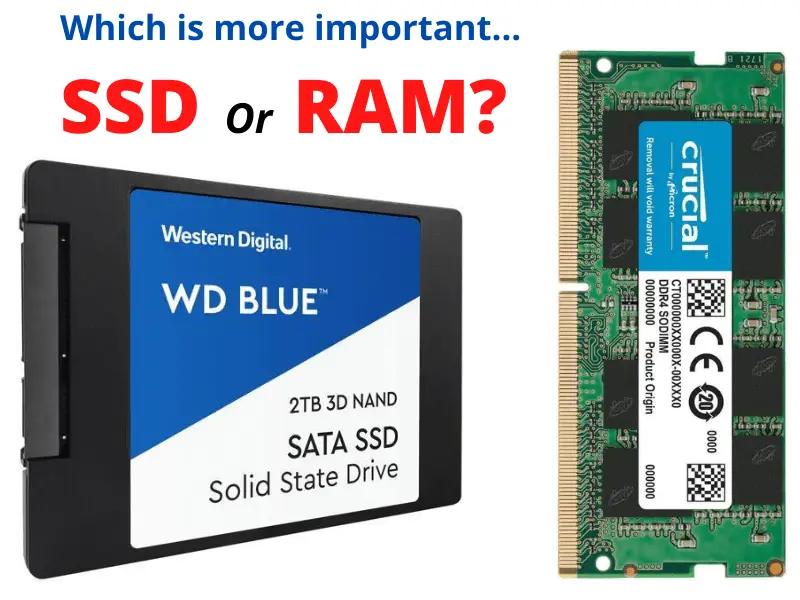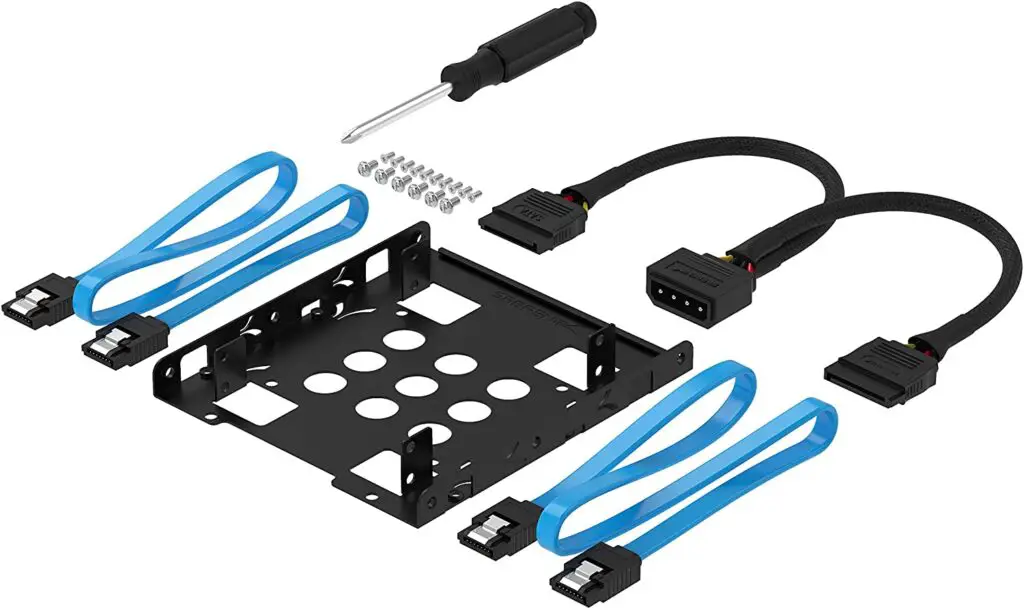Are you looking to improve the performance of your computer? When it comes to increasing system speeds, the RAM and storage units are often good places to start.
Here, we’ll highlight a few bits about RAM and SSDs, and why upgrading them is crucial in improving your overall system performance.
The Importance of SSDs and RAM for your Computer System
SSDs and RAM serve different functions and are both important for your computer. SSDs are a long-term storage option, offering superior speeds and efficiency to HDDs. RAM is the system’s short-term memory, holding currently in-use data for the session. When power is unavailable, this data is lost.
Table of Contents

Importance of SSD in Laptop or Computer?
HDDs have long been the go-to option for storage on our laptops and computers. With recent developments, however, the computing market is seeing a gradual shift to the use of SSDs.
Despite this fact, SSDs have been around since the early 90s. Their uptake into the market was slow due to some reasons, but that has changed slowly. Current trends are proving just how popular they are.
To adequately realize the importance of an SSD to your computer or laptop, let’s first highlight a fundamental difference between them. HDDs comprise magnetic discs which rotate during operation. These discs store the data and, they are accessed using a magnetic head, responsible for reading and writing to them.
SSDs, on the other hand, comprise flash memory cells. These memory cells (Also known as NAND cells) are positioned statically on the SSD.
Because of their different architectures, it’s easy to deduce that the two media work differently. Their design and how they work affects their performance.
In a nutshell, SSDs bring the following merits over HDDs:
- Faster access times because of their superior memory technology.
- Reduced susceptibility to wear and tear. (Due to the absence of movable parts.)
- Better power efficiency since they consume less power.
- They operate quieter and cooler thanks to the absence of movable parts.
Importance of SSD in Gaming?
SSDs resolve several issues that conventional HDDs present. In this regard, it’s the issue of speed that stands out most.
HDDs have a maximum read speed of slightly above 150MB/s. Their write speeds max out at around 120MB/s.
SSDs, on the other hand, provide speeds of at least 530MB/s for either read or write operations. With an M.2 SSD, these speeds go higher, reaching an average of 4GB/s for either read or write tasks.
With those points in mind, let’s talk about the game. The recent past has seen exponential growth in gaming, with titles coming out that pay attention to detail and graphics. With the increased level of detail and data, the size of the games has grown also.
A game at its core is simply another program on your computer. For the system to access it, the files associated with it are sought and read from the storage component. Given the size of recent gaming titles, there is a lot more data to install and read.
SSDs can seek and access files faster than HDDs can. This fact means they can allow for a better gaming experience compared to HDDs.
Is SSD Important for Multitasking?
We use our computers to run several tasks every day, and sometimes those tasks are run concurrently. Multitasking involves processes utilizing the available resources simultaneously. (A Task in computing terms is a unit of work, i.e. a job that needs handling)
That said, virtually every task that your computer handles involves a read or write operation. HDDs and SSDs have significantly varying speeds when it comes to executing read and write operations.
Conventionally used HDDs have a maximum speed of 150MB/s for reading and 125MB/s for write operations.
SSDs, on the other hand, have a minimum speed of 530MB/s for reading or write operations. The speeds provided by SSDs go much higher when it’s an NVMe based SSD. These types of SSDs reach speeds averaging around 4GB/s.
With this difference in mind, we can see SSDs are better suited to multitasking since they have superior speeds and can complete tasks faster than HDDs.
Importance of RAM in Laptop or Computer?
RAM (Random Access Memory) is a volatile storage component on your computer. It’s responsible for holding instructions for currently in use programs. The fact that it’s volatile means that this data is lost whenever power is unavailable.
Whenever you run a program or application, the system first finds it on the HDD or SSD. After it’s located and loaded, some of its associated data remains on the RAM. The data and instructions held in the RAM allow the user to resume the utility of any of the open programs quickly.
By storing these bits of data, RAM eliminates the need to reload them from the HDD from scratch whenever you want to resume using it from another task.
Importance of Ram for Gaming?
While running an application, a portion of the RAM stores bits of data about it. This fact holds for games as well since they are applications on their own as well.
Let’s step back and recall two details. The first is that RAM is a type of memory on your computer used to store volatile data. (Data and program instruction about current tasks.)
The second detail is that your HDD or SSD is the storage unit on your computer. All program installations occur on it, and it holds all their associated files.
As you start an application, the computer seeks it on the HDD or SSD and loads it up. At the same time, the system assigns a chunk of the RAM towards the application. This chunk holds the data and instructions associated with the app to allow its access to be faster than having to read it off the main memory every time.
When running a game, it gets assigned a portion of the RAM, as earlier stated. Depending on the size and number of files associated with it, it takes up an adequately corresponding amount.
If the total RAM available is enough, both the game and other tasks will continue functioning adequately. Should that not be the case, none of the programs, the game included, can run efficiently.
Is RAM Important for Multitasking?
RAM is an integral part of a computer system. Quite frankly, among many everyday computer users, there’s a saying that the more RAM you have, the better off you are.
This statement isn’t exactly a fallacy since more RAM guarantees better system performance, especially when discussing multitasking.
Multitasking is simply that; executing or performing multiple tasks concurrently. In the case of a computer system, as is the case with many real-world circumstances, multitasking can be inhibited by the number of available resources.
Remember, RAM is used to hold data about currently performing tasks. Each task gets assigned a part of the RAM’s memory when executing. So if the amount of RAM you have on-board is enough, you will observe that tasks execute and run smoothly.
If the amount of RAM is lacking, multitasking becomes difficult. You may experience slow responses from your computer when running more than one program or starting new tasks.
For simple computer tasks, 8GB of RAM is a reasonable amount of RAM to have. Heavier programs like games or video editors tend to demand even more RAM, at least 16GB.
What will make my Computer Faster, SSD or RAM?
Upgrading either of these components will improve your system’s performance in the right conditions.
An SSD offers better performance compared to HDDs in many aspects. Concerning speed, the least amount to expect from an SSD is about 530MB/s for either read or write operations. Conventional HDDs can’t do transfer speeds higher than 150MB/s for either task.
RAM is responsible for storing relevant information and data about applications and jobs currently in use or progress.
Increasing your RAM capacity allows your computer to switch between tasks faster and more efficiently. The catch here is, if you have more RAM than your system demands, it will end up being un-utilized.
This fact is because RAM holds a specific amount of data for any application for later retrieval. Even if you have more RAM, the program will still require the same RAM allocation for its data. So, the extra RAM remains idle.
SSDs, on the other hand, can have an almost immediate impact on your system.
See, in a computer system, the slowest processes are the read and write operations. Considering how much more speed an SSD offers in comparison to HDDs, its implementation in your system will prove warranted.
Should you Upgrade SSD or RAM?
SSDs and RAM perform different functions on your computer and therefore affect its performance differently. A reasonable upgrade in either or both of these parts would be beneficial to your system.
RAM is a component on your computer essentially responsible for ensuring tasks run smoothly. When a program starts, it’s first read off of the storage unit you have onboard i.e. SSD or HDD. Once running, the data and files associated with it load onto the RAM.
It does this so that as you use different programs on your computer, you can quickly return to using any of them without delay. The delay, in this case, would be the system having to read the program files off the HDD or SSD again, which is slower than having them read off the RAM.
SSDs, on the other hand, are simply storage alternatives to the conventional HDD albeit, with better performance. They feature better memory technology and efficiency and deliver better results compared to HDDs.
When it comes to selecting which of these components to upgrade, it ultimately depends on your needs. Do you need better storage capacity and efficiency? Or is it getting rid of the sluggish performance of your programs that is more important?




